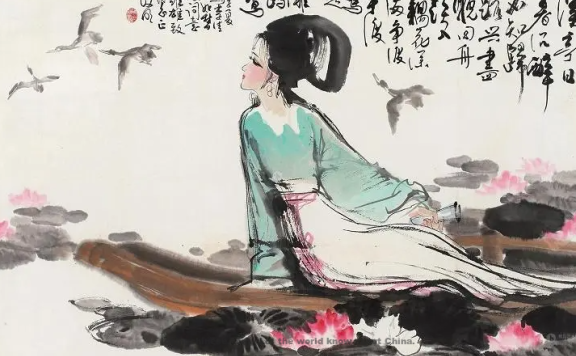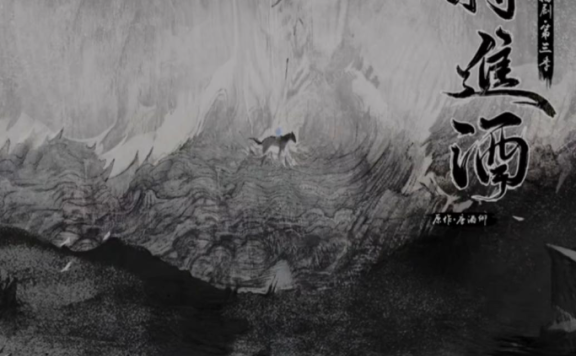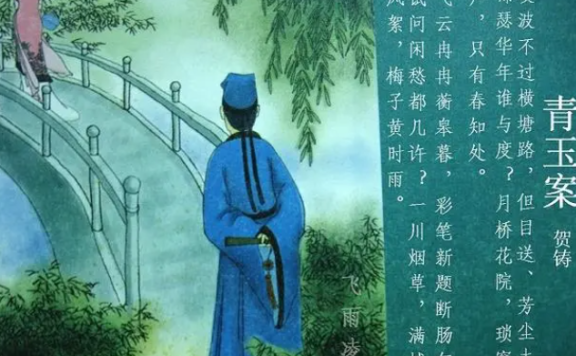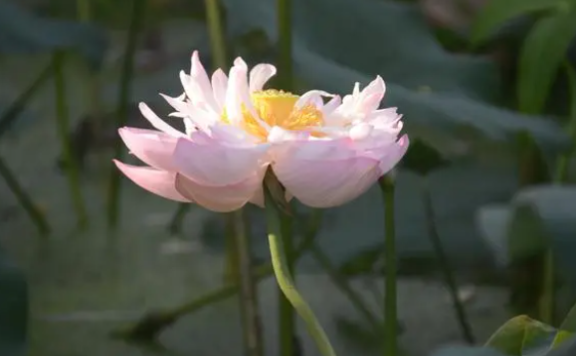-
Daolianzi: He Zhu ~ 《捣练子·砧面莹》 贺铸 with English Translations
This poem "Dou Lian Zi·Zhen Mian Ying" is the third poem in the "Dou Lian Zi" series by He Zhuo of the Song Dynasty. The poem describes a woman who misses her husband and sends him a piece of military clothing. Her husband is thousands of miles away to the west of Yumen Pass. When she writes the letter home, her tears flow with the ink, which makes people sigh. Although boudoir resentment is a common theme in poetry, the specific description of this poem is actually a universal social problem in ancient feudal society, which has a profound practical significance. 这首《捣练子·砧面莹》是宋代贺铸《捣练子》组词的第三首。词中描写了思妇捣好征衣寄给戍守边关的丈夫,丈夫远在万里之外的玉门关的西边,写家书时泪随墨下,令人唏嘘不止。闺怨虽是词中常见题材,但该词所具体描写的实是古代封建社会中一个带有普遍性的社会问题,具有较深刻的现实意义。 《捣练子·砧面莹》 贺铸 砧面莹,杵声齐,捣就征衣泪墨题。寄到玉关应万里,戍人犹在玉关西。 Daolianzi He Zhu The laundry block is smooth and bright.Each blow is delivered aright.As she writes, off her tears she blink.Thus, she writes with tears mixed with ink.The parcel sent to Yumenguan1Ten thousand li off, to her man—Would reach him, indeed, some fine morn.Her husband would then be farther gone.1. Yumenguan: a pass in Gansu Province- 126
- 0
-
He Zhu: Zhegutian ~ 《鹧鸪天·重过阊门》 贺铸 with English Translations
"Quail Sky: Revisiting Changmen, Everything Is Different" was written by He Zhuo, a poet in the Song Dynasty, in memory of his deceased wife, Zhao. The poem is very sad and touching, and is a rare masterpiece among the poems of mourning after the Tang and Song Dynasties. When He Zhuo had to leave Suzhou, where he and his wife lived together, he felt that things had changed and had nowhere to vent his sorrow. He could only lament, "Why did we come together but not return together?" Listening to the night rain in the south window, thinking of his wife mending his clothes in the middle of the night, the author expressed his deep nostalgia for his deceased wife who had shared hardships and supported each other. In terms of expression, this poem combines the three elements of fu, bi, and xing, enriching the means of emotional expression and enhancing the artistic touching power. 《鹧鸪天·重过阊门万事非》是宋代词人贺铸为悼念亡妻赵氏而作。全词写得很沉痛,十分感人,是唐宋之后悼亡诗歌中不可多得的名篇。当时贺铸不久因事要离开夫妇共居的苏州时,痛感物是人非,满腹辛酸无处倾诉,只能发出“同来何事不同归”的哀叹。聆听着南窗的夜雨,遥想当年妻子在深夜里为自己补衣的情形,作者沉痛地表现出了对亡妻患难与共、相濡以沫之情的深切怀念。在表现手法上,此词将赋比兴三者参酌运用,丰富了情感表现手段,增强了艺术感人力量。 《鹧鸪天·重过阊门》 贺铸 重过阊门万事非,同来何事不同归,梧桐半死清霜后,头白鸳鸯失伴飞。原上草,露初晞,旧栖新垄两依依。空床卧听南窗雨,谁复挑灯夜补衣? Zhegutian He Zhu Again, I pass Suzhou1, when all's wrong with me.Both came but only one left: how could that be!I'm like a mandarin duck without its mate;Or tung trees, after frost, in half-dying state.I'm like meadow grass from which dew…- 69
- 0
-
He Zhu: Fairy Beauty Recalled ~ 《忆仙姿·梦想山阴游冶》 贺铸 with English Translations
He Zhu (1052-1125) was a poet in the Northern Song Dynasty. His courtesy name was Fanghui, and he was also known as He Sanchou. He was also known as He Meizi, and he called himself the Old Man of Qinghu. He was of Han nationality, and his ancestral home was Shanyin (now Shaoxing, Zhejiang). He was born in Weizhou (now Weihui City, Henan Province). He was born in an aristocratic family, and was the grandson of Empress He of Song Taizu. He also married a daughter of the royal family. He claimed that his distant ancestor originally lived in Shanyin, and was a descendant of He Zhizhang of the Tang Dynasty. Because Zhizhang lived in Qinghu (i.e. Jinghu), he called himself the Old Man of Qinghu. He Zhu was tall and had high eyes, a sullen complexion, and was known as He Guitou. He once served as a palace guard in the right class. During the Yuanyou period, he served as the Tongpan of Sizhou and Taipingzhou. In his later years, he retired to Suzhou and proofread books. He did not attach himself to the powerful and liked to discuss world affairs. He was good at poetry and prose, especially… -
He Zhu: Fairy Beauty Recalled ~ 《忆仙姿·江上潮回风细》 贺铸 with English Translations
He Zhu (1052-1125) was a poet in the Northern Song Dynasty. His courtesy name was Fanghui, and he was also known as He Sanchou. He was also known as He Meizi, and he called himself the Old Man of Qinghu. He was of Han nationality, and his ancestral home was Shanyin (now Shaoxing, Zhejiang). He was born in Weizhou (now Weihui City, Henan Province). He was born in an aristocratic family, and was the grandson of Empress He of Song Taizu. He also married a daughter of the royal family. He claimed that his distant ancestor originally lived in Shanyin, and was a descendant of He Zhizhang of the Tang Dynasty. Because Zhizhang lived in Qinghu (i.e. Jinghu), he called himself the Old Man of Qinghu. He Zhu was tall and had high eyes, a sullen complexion, and was known as He Guitou. He once served as a palace guard in the right class. During the Yuanyou period, he served as the Tongpan of Sizhou and Taipingzhou. In his later years, he retired to Suzhou and proofread books. He did not attach himself to the powerful and liked to discuss world affairs. He was good at poetry and prose, especially… -
He Zhu: Fairy Beauty Recalled ~ 《忆仙姿·莲叶初生南浦》 贺铸 with English Translations
"Recalling the Fairy's Figure: Lotus Leaves First Born in Nanpu" was written by He Zhuo in the Northern Song Dynasty. It is a short poem describing a woman who misses her lover and longs for him to return. It describes the scenery of the Nanpu shore and the farewell scene when September turns to autumn, and expresses the woman's longing for him implicitly and vividly. Although there is no mention of separation and longing in the whole poem, it describes the feelings of separation and longing vividly. The whole poem uses scenery to set off the feelings and expresses the feelings in the scenery. It can be said to be a good example of a short poem with a long feeling. 《忆仙姿·莲叶初生南浦》是北宋贺铸所作,是一首描写思妇盼人归的小令,描写了九月入秋时,南浦岸边的景色及送别的场景,含蓄而形象地表达出了思妇的相思之情。全词虽无一字提到离别相思,却将离别相思之情写得淋漓尽致。全词以景衬情,寓情于景,可谓词短情长的佳例。 《忆仙姿·莲叶初生南浦》 贺铸 莲叶初生南浦,两岸绿杨飞絮。向晚鲤鱼风,断送彩帆何处?凝伫,凝伫,楼外一江烟雨。 Fairy Beauty Recalled He Zhu Young lotus leaves in Southern Pool begin to sprout;Green willow down on both the shores flies all about.Towards evening wet summer breeze blows;Who knows where my lord’s painted ship goes?I stand there stillAnd gaze my fillBeyond my bower mist veils hill on hill,And rill on rill. -
He Zhu: Fairy Beauty Recalled ~ 《忆仙姿·日日春风楼上》 贺铸 with English Translations
He Zhu (1052-1125) was a poet in the Northern Song Dynasty. His courtesy name was Fanghui, and he was also known as He Sanchou. He was also known as He Meizi, and he called himself the Old Man of Qinghu. He was of Han nationality, and his ancestral home was Shanyin (now Shaoxing, Zhejiang). He was born in Weizhou (now Weihui City, Henan Province). He was born in an aristocratic family, and was the grandson of Empress He of Song Taizu. He also married a daughter of the royal family. He claimed that his distant ancestor originally lived in Shanyin, and was a descendant of He Zhizhang of the Tang Dynasty. Because Zhizhang lived in Qinghu (i.e. Jinghu), he called himself the Old Man of Qinghu. He Zhu was tall and had high eyes, a sullen complexion, and was known as He Guitou. He once served as a palace guard in the right class. During the Yuanyou period, he served as the Tongpan of Sizhou and Taipingzhou. In his later years, he retired to Suzhou and proofread books. He did not attach himself to the powerful and liked to discuss world affairs. He was good at poetry and prose, especially… -
He Zhu: Song of Pounding Clothes An Endless Night ~ 贺铸·《捣练子·夜如年》 with English Translations
He Zhu (1052-1125), courtesy name Fanghui, self-proclaimed Qinghu Yilao, was a native of Shanyin (now Shaoxing, Zhejiang) and lived in Weizhou (now Jixian, Henan). He was tall and had high eyes and a sullen face, and was known as He Guitou. He was a grandson of Empress Xiaohui and was appointed as the Right Palace Guard. During the Yuanyou period, he served as the Tongpan of Sizhou and Taipingzhou. In his later years, he retired to Suzhou and proofread books. He did not attach himself to the powerful and liked to discuss world affairs. He was good at poetry and prose, especially ci. The content and style of his ci were relatively rich and diverse, with the strengths of both bold and graceful schools. He was good at tempering language and integrating the sentences of his predecessors. He used rhymes very strictly, with a sense of rhythm and musical beauty. Some of his works depicting spring flowers and autumn moons have lofty artistic conception and rich and sad language, similar to Qin Guan and Yan Jidao. His works about patriotism and worry about the times are tragic and passionate, similar to Su Shi. Xin Qiji, a patriotic poet in the…- 66
- 0
-
He Zhu: Song of Pounding Clothes Waiting for Letters ~ 贺铸·《捣练子·望书归》 with English Translations
"Waiting for Letters" is the sixth poem in the "Waiting for Letters" series by He Zhu of the Song Dynasty. The poem says that due to the long distance to the border, it is inconvenient to send mail, so the woman who misses her husband hopes that the clothes she sent to him can be worn by him as soon as possible. She can only meet her relatives many times in her dreams, and she only hopes to receive letters from them next year. The language of the whole poem is simple, but the emotions are deep and gentle, and it is sad and tortuous. 《捣练子·望书归》是由宋代贺铸《捣练子》组词的第六首。词中写道,由于边关路远,传邮不便,思妇希望寄送的征衣早日穿在丈夫身上。只有在梦中才可能与亲人多次相见,只盼望来年能得到亲人的书信。整首词语言质朴,而又感情深婉,哀伤曲折。 贺铸·《捣练子·望书归》 边堠远,置邮稀,附与征衣衬铁衣。连夜不妨频梦见,过年惟望得书归。 Song of Pounding ClothesWaiting for Letters He Zhu Far-off is the frontier,And post-stations are few.I send you cotton clothes for your armor bright.Why don't you often come in dreams from night to night?What I expect next yearIs but letters from you.- 73
- 0
-
He Zhu: Song of Pounding Clothes Cutting My Warrior’s Gown ~ 贺铸·《捣练子·剪征袍》 with English Translations
"Dou Lian Zi·Jian Zheng Pao" was written by the poet He Zhuo, whose courtesy name was Fang Hui. He was from Shanyin and was good at writing poetry and prose, especially lyrics. This is a farewell poem expressing the sadness of parting. 《捣练子·剪征袍》,是由诗人贺铸所作,贺铸, 字方回,山阴人,能做诗文,特别擅长作词。这是一首表达离别愁绪别留诗。 贺铸·《捣练子·剪征袍》 抛练杵,傍窗纱,巧剪征袍斗出花。想见陇头长戍客,授衣时节也思家。 Song of Pounding ClothesCutting My Warrior's Gown He ZhuPutting my beetle down,I leanBy window screenTo cut out flowers on my warrior's gown.I think of him long stationed on northwest frontier.When he receives the gown, won't he think of me here?- 65
- 0
-
He Zhu Poem: Dreaming of the South · Peaceful Time – 贺铸《梦江南·太平时》
The lyrics of He Cast's "Dreaming of the South · Peaceful Time" are not a general account of a spring trip or a description of the spring scenery, but a very sincere hometown thought permeates them and expresses the lyricist's temperament, which can be said to be "unengravable in the whole piece and unyielding out of the words".- 20
- 0
-
He Zhu Poem: Hard Is the Way – 贺铸《行路难·缚虎手》
The song "Hard Is the Way" is a work by He Jiu, a lyricist of the Northern Song Dynasty.- 19
- 0
-
He Zhu Poem: Prelude to the Song of Six States – 贺铸《六州歌头·少年侠气》
The lyrics of "Prelude to the Song of Six States" are written by He Chuan, a Song Dynasty lyricist.- 22
- 0
-
He Zhu Poem: The Terrace Wall – 贺铸《台城游·南国本潇洒》
This is a poem by He Chuan of the Northern Song Dynasty.- 31
- 0
-
He Zhu Poem: Scraping the Sky · Song of the Yellow Mountains – 贺铸《凌歊·铜人捧露盘引》
The lyric "Scraping the Sky · Song of the Yellow Mountains" is a lyric written by He Chuan, a famous lyricist of the Northern Song Dynasty, which says: "Controlling the Cangjiang River, rowing the green peaks, the Yantai is cool.- 17
- 0
-
He Zhu Poem: Invitation to Wine – 贺铸《将进酒·城下路》
The lyric "Invitation to Wine" is a lyric composed by He Chuan, a lyricist of the Northern Song Dynasty.- 22
- 0
-
He Zhu Poem: Green Jade Cup – 贺铸《青玉案·凌波不过横塘路》
" Green Jade Cup" is a work by He Chuan, a lyricist of the Song Dynasty.- 28
- 0
-
He Zhu Poem: Lovesick Song of the Lute · Parting with a Friend – 贺铸《琴调相思引·送范殿监赴黄冈》
A Farewell Lyric written by He Chuan, a lyricist of the Northern Song Dynasty.- 17
- 0
-
He Zhu Poem: Treading on Grass To Lotus – 贺铸《踏莎行 荷花》
踏莎行荷花 贺铸 杨柳回塘,鸳鸯别浦。绿萍涨断莲舟路。断无蜂蝶慕幽香,红衣脱尽芳心苦。返照迎潮,行云带雨。依依似与骚人语。当年不肯嫁东风,无端却被秋风误。 Treading on GrassTo Lotus He Zhu On winding pool with willows dim,At narrow strait the lovebirds swim.Green duckweeds float,Barring the way of lotus-picking boat.Nor butterflies nor beesLove fragrance from the withered trees.When her red petals fall apart,The lotus bloom's bitter at heart.The setting sun greets rising tide,The floating clouds bring rain.The swaying lotus seems to confideHer sorrow to the poet in vain.Then she would not be wed to vernal breeze.What could she do now autumn drives away wild geese? Notes:The poet describes the lotus bloom and compares its bitter heart to his own.
Checking in, please wait...
Click for today's check-in bonus!
You have earned {{mission.data.mission.credit}} points today
My Coupons
-
¥CouponsLimitation of use:Expired and UnavailableLimitation of use:
before
Limitation of use:Permanently validCoupon ID:×Available for the following products: Available for the following products categories: Unrestricted use:Available for all products and product types
No coupons available!
Unverify
Daily tasks completed
























